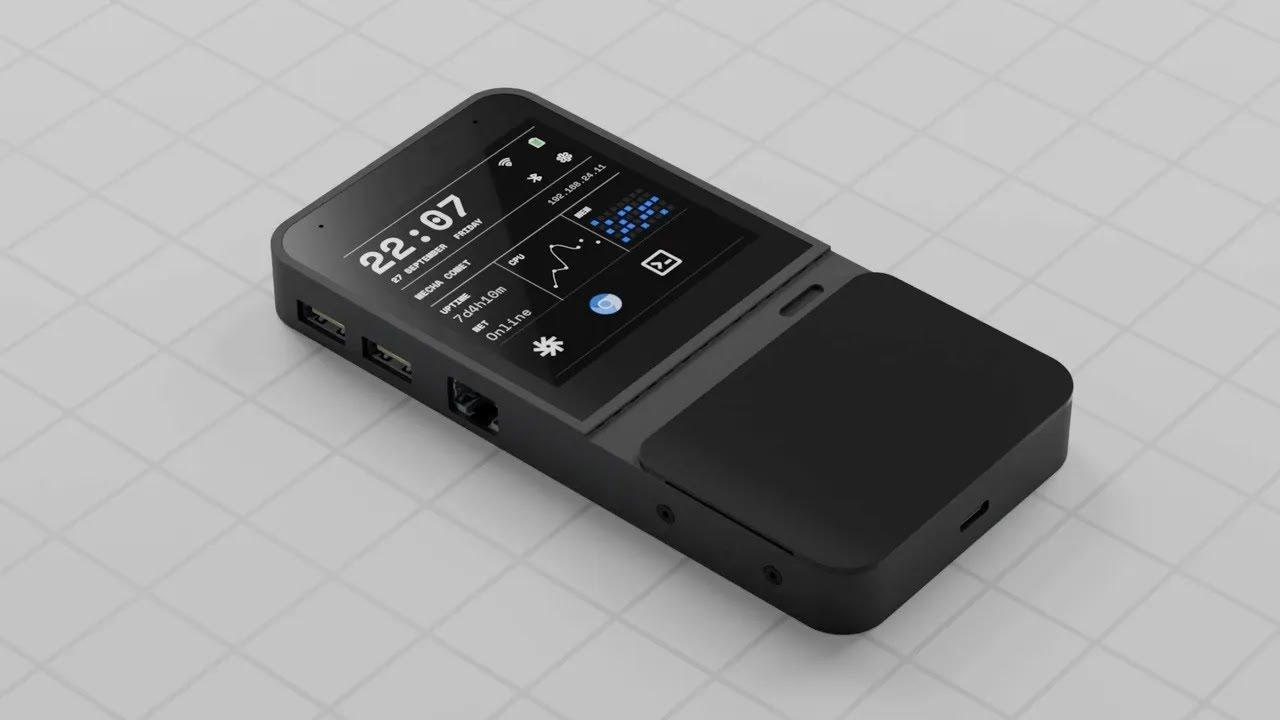Another handheld! Although not a gaming handheld like you may have been thinking. The Mecha Comet is a small handheld modular Linux computer around the size of a phone. For GamingOnLinux readers who love tinkering, it looks like quite a fun little device.
Powered by Mechanix OS (Debian Linux based) it has an interesting modular snap-on front-face that allows you to change the inputs on the device. Extensions for the front include a gamepad, keyboard and GPIO (general-purpose input/output) for you to make your own.

Main tech specs:
|
Operating System |
Mechanix OS (Linux, Debian) |
| CPU |
1.8 GHz Quad-core ARM Cortex-A53 (64-Bit) |
| Memory |
4GB LPDDR4 RAM |
| Storage |
32 GB Flash (eMMC) |
| Wireless |
2.4 GHz/5.0 GHz 802.11ac, Bluetooth 5.0 |
| Display |
3.4" IPS LED Display, Capacitive Touch |
| PCIe |
M.2 Slot (PCIe 2.0, 1x lane) |
| Camera |
5 MP (with Auto-focus) |
| Audio |
2x Digital Mic, HD Speaker |
| Power |
3000 mAH Battery, Type-C (5V) |
| Ports |
1x Gigabit Ethernet, 2x USB 2.0 |
| Peripherals |
Gyroscope, RTC, ADC |
| Security |
Trust Anchor (CC EAL 6+), Accelerated Crypto |
|
Dimensions (mm/in) |
150mm x 73.55mm x 16mm (220g) |
I don't have any need at all for it, but it's another device like the Pilet that I just kind-of want to have.

Direct Link
For the operating system you get full access to Debian packages, and of course people can port it over to whatever distro they like. Their team said their Mechanix Shell is built in rust and supports GPU rendering on Wayland, plus they built an open source UI framework to build on top of their shell. The hardware is designed to be easy to repair and extend too.
See more on their website and upcoming Kickstarter.
Last edited by Drakker on 10 Jan 2025 at 1:53 pm UTC
In recent years I have become better informed about the privacy invasions which Big Tech companies (Apple, Google, Amazon, Tesla, Microsoft, etc) are inflicting on society. Apple and Google's phones are designed to snoop on users and collect loads of information. Each person gets profiled, targeted, and ultimately manipulated. I go out of my way to prevent data collection, to conserve my privacy. (There are lots of ways to do this, e.g. Using Firefox or Brave browser, using Ublock Origin tracker blocking, using [privacy search engines](https://www.privateproxyguide.com/best-private-search-engines/)/not Google search, using Linux desktop, and using Degoogled Phones.)
Currently I run a selection of custom firmwares on Android phones. Some firmwares are replacing Android with Linux. Some firmwares replace 'stock' Android (as provided by the phone manufacturer) with AOSP firmwares (Android Open Source Project, the base operating system before Google adds their spying proprietary components).
Some Linux firmwares (that can be used on specific Android phones): [Droidian](https://droidian.org/), [Ubuntu Touch](https://ubports.com/), SailfishOS, PostmarketOS.
Some decent degoogled Android operating systems: GrapheneOS, CalyxOS, [LineageOS](https://lineageos.org/), e/OS (E Foundation), [DivestOS](https://divestos.org/), LMODroid.
but boooo kickstarter yet again
I'll keep an eye on it though and see if it makes it to proper market.
Having ethernet and USB ports makes the device useful for people working in the auto industry as well as those working in networking. Smart idea.
Network architect's dream. I didn't have an ethernet tester when we were building our home, so I was just walking around the house with the electrician to every room with my heavy ass laptop with a usbc->eth adapter dangling off of it, and perching in mid air to connect to the wall socket and test it. This device would be perfect for that!
I do like the discussions around how cool it'd be to have a little open source linux phone
Had my midrange phone about 6 years and needing an upgrade, mostly because it's battery is starting to go but honestly would love something more open-source
Same reason I never bought a tablet, not a big fan of how closed down they are, so I'd love a little open source tablet like the pilet as well
Last edited by Drakker on 11 Jan 2025 at 12:03 am UTC
I was just walking around the house with the electrician to every room with my heavy ass laptop with a usbc->eth adapter dangling off of itYou and me both, that was exactly my painful experience too. However, I do think the eth, while awesome, is overkill here. A little usb->eth dongle would suit me.
Edit to add, I went back to look at the Pilet again and while both are appealing (particularly the larger Pilet model), I have to say this Mecha is waaaay more stylish. And I love the modular keyboard and gamepad options. Just a shame these are Kickstarter projects. Got a wait on hands, I guess.
Last edited by scaine on 10 Jan 2025 at 11:17 pm UTC
I would do unspeakable things for a linux phone that could be used as a daily driver. Unfortunately this does not exist, and it doesn't look like it'll be existing anytime soon either. Sad.
Fret not, I'm here to get you into big BIG trouble.
I've thought a lot about this lately and there are some solutions.
Option 1. You root any Thin Small Android Cellphone with LineageOS, and literally don't use it -- you can optionally remove the cameras, microphone if you so desire and install literally nothing on it. You build it into the same case as a Linux Phone and tether the Internet connection and tunnel the whole thing over VPN. It'll be slightly larger, but have access to popular cellular network without exposing much data to Android.
Option 2. The return of the car-phone. You add a extra battery to your car trunk and attach it to a Linux Car Server that is attached to a StarLink Mini Roam dish ($50/mo) mounted on your car. You also broadcast Wifi from the car and connect a Linux device such as this. The car computer can have a mod screen in the middle and double as a music, video, game, and entertainment center on the go. You heard a truck carrying hard drives driving down the road has more throughput, don't let your dreams be dreams.
Option 3. You wait for StarLink Direct to Cell and either use a officially supported device, or you hope one of us makes a "Modem Wifi Brick" like in Option 1.
--
With these options in mind -- it really is daft that we are carrying around these non-Linux devices. I wouldn't be surprised if we see some people make this in the modder community in the next year. Using Stock Android is miserable. The sooner we cross this bridge the better.
Edit: Just to comment more on Option 2 -- it's much easier to give a car computer a stronger CPU and GPU too, so if you stream to the phone or screen you could probably achieve some pretty impressive results in terms of speed. Like imagine playing AAA games broadcasted from your car. It's doable. Maybe you have a old LCD Steam Deck laying around too -- might make a pretty decent car computer with a more specialized distro installed. Disconnect the left and right daughterboards, put it in a metal case or whatnot -- 15-30 watts isn't too bad.
Last edited by ElectricPrism on 11 Jan 2025 at 1:44 am UTC
It's giving future palm pilot vibes tho.
The Pinephone is getting there...Is it though? I watched closely for the Pine company to deliver for years now and all the energy seemed to dissipate in the last couple of years. They can't even bring themselves to make a monthly newsletter a yearly occurrence. Such a shame.
I own couple of their products and the support for Pinebook Pro is meh at best - sleep functionality is broken still and no news about it being fixed apart from some obscure hacks that ultimately don't work. Same should be true with the second Pinephone, which has the same hardware, basically.
But I'm not here to badmouth and the question is legit - are they doing something, anything really with the Pinephone (the original or the second one)?
Droidian, Ubuntu Touch, and SailfishOS each provide good interfaces for touchscreen phone use. All the basic functionality is available: Camera, Phone Calls, SMS Messaging, Internet Browsing, Media Players, Photo Gallery, Calendar, Contacts Manager, Local Weather, Ebook Readers, Calculator, and other basic software.
A lot of Android apps are just web-apps and can be replaced by engaging with a website rather than an app. As such you don't need to install certain Android apps to have access to that functionality.
But there is also something known as Waydroid. Waydroid can run Android (AOSP) inside a container on top of the Linux phone OS. This means you *can* install regular Android Apps onto a Linux phone (i.e. the OSes I listed above) and use most of them. For instance, I've installed the "Open Camera" Android App on Ubuntu Touch and Droidian, and then used that Android Camera App to take photos on a Linux phone. You won't be able to run every Android App like this, but plenty work just fine.
As such, I feel that this functionality is certainly good enough for many people to use as a daily driver (particularly if that person is already good at using Linux, on the desktop).
Oh, one more thing: Having Linux on a mobile phone gives you a lot of advantages compared to Android. You can use partitions how you'd like (e.g. SD cards), you can "rsync" files from your computer to your phone. You can "ssh" into your phone from your home network. You can run bash and python scripts, use the phone as a proper desktop (connected to a monitor over usb-c). You can run lots of desktop Linux software on the phone (e.g. desktop Thunderbird, desktop Firefox), or terminal Linux software (e.g. sshfs, nmap, tcpdump, wget).
Having Linux on a mobile phone gives you a lot of advantages compared to AndroidI think that there's no one that will argue against it. The real question is - is there a linux phone to be found? And can it run anything except the most rudimentary applications? Librem is overpriced and was marred with allegations of scamming people, Volla makes (AFAIK) good devices and the OS, but it's linux-based, and I'm not sure how open it is. Pinephone (first) is a well-rounded and fairly open device that supports linux, but the specs are low as hell. Pinephone pro has better specs, but inherent bugs that will not be fixed, it seems. Some devices claim linux support, but it means some closed version of the 4.xx kernel or some such, not mainline. postmarketOS and ubuntu touch has reportedly full feature set on like 1-3 android devices from 2018! The software stack may be ready as hell (although I would argue that it's undercooked still), but there's no proper hardware support or availability across the board. And it's cultist territory! The amount of effort to get the device and then integrate it in your own life is a challenge in itself, even if you're good with linux.
@ElectricPrism & @g000h ... these aren't really options for daily drivers though are they? And what is mentioned about the software is fine and all, but wheres the hardware?
I know use cases will vary wildly from person to person, but for me, my definition of "daily driver" phone would be:
- all day battery life with medium usage of all the below stuff - I don't mind charging if I'm doing a heavy usage day, but for light to medium day to day use I don't want to charge at all
- make and receive phone calls and sms reliably (I know this seems silly to mention, but there are some linux "phones" out there that struggled to do this) with push notifications
- install signal and whatsapp with push notifications
- install my bank app because that's how I deposit checks
- sync a calendar with my wife because that's how we coordinate childcare drop offs and pickups
- listen to podcasts / music
- reliably navigate somewhere with a mapping app and gps
- send and receive emails with push notifications
- reliably take pictures and videos in decent quality
I know use cases will vary wildly from person to person, but for me, my definition of "daily driver" phone would be:If I had the banking app requirement, I'd be out of luck, but the rest of your list is covered by Jolla's Salfish OS on Sony Xperia phones for me and my wife. It's not perfect, but everything pretty much works like I expect it to work, and my (subjective) user experience is better. Very limited choice of hardware obviously, but I don't really care as long as I can always find something that's supported and affordable.
Native software selection isn't perfect, but the Android app support is good, and anything that doesn't absolutely require Google's services tends to work just fine. I've only got Signal, the Steam app and KOReader installed that way myself, everything else is native. Oh and we've never used WhatsApp. It might not work I suppose.
The fact that the phone runs a very familiar Linux stack with Wayland, PulseAudio etc. is a fun bonus. There are some closed UI bits and hardware driver blobs I suppose, but at least I can switch to dev mode, start up a terminal and ssh away or check some logs, divert audio to my desktop via a remote audio sink or whatever, if I want to. I rarely do, but still, it's there if I feel like fiddling.
If this thing could also make phone calls out of the box without an external attachment I'd buy it and ditch my old Android phone in a heartbeat.
Ditto for me (well, as long as it worked with my service provider)... To this day, my partner and my daughter think it's the funniest thing in the world as I swear at my iPhone all day and complain that I want a damn BlackBerry.
My partner reckons she'd be rich if she had $1 for every time I said "Just give me a damn BlackBerry!" every day.
Some Linux firmwares (that can be used on specific Android phones): Droidian, Ubuntu Touch, SailfishOS, PostmarketOS.
Ubuntu Touch was amazing, and I actually used it as my "daily driver" for a while.. I still have a "like new" bq Aquaris E5, which coincidentally, I charged up tonight (I pull it out of the box every six months, run it down and charge it back up again).
I'd still prefer a BlackBerry, but in the touchscreen era, Ubuntu Touch has been my favorite so far.
but boooo kickstarter yet again
I'll keep an eye on it though and see if it makes it to proper market.
Yeah, I don't do crowd-funding anymore... Too many projects "taking the money and running".
Never once did I back a project with the view of "buying" something; it was always about backing an idea that I legitimately believed in... But time after time, I watched as many projects that I backed - including some major ones - took the money and ran.
So as tempting as it is, I wait until they hit the market these days.
Option 3. You wait for StarLink Direct to Cell and either use a officially supported device, or you hope one of us makes a "Modem Wifi Brick" like in Option 1.
If this ever becomes a reality in Australia, I'll be changing my cell phone over immediately, and probably the bazillion phones on my account, too (I have all the family on my account).
I already have Starlink for my home broadband, which is fantastic by the way... I'd love to run my cell phones over the network, too.
Droidian, Ubuntu Touch, and SailfishOS each provide good interfaces for touchscreen phone use. All the basic functionality is available: Camera, Phone Calls, SMS Messaging, Internet Browsing, Media Players, Photo Gallery, Calendar, Contacts Manager, Local Weather, Ebook Readers, Calculator, and other basic software.
A lot of Android apps are just web-apps and can be replaced by engaging with a website rather than an app. As such you don't need to install certain Android apps to have access to that functionality.
This.
I was using Ubuntu Touch as my "daily driver" back in ~2017 and whilst it wasn't as polished as Google Android (which is what I came from), it was pretty good... Usage times weren't too bad and most stuff could be replicated via a web site.
There were some holes in the functionality of course, but they weren't so enormous that the phone was unusable.
--
I'm surprised that nobody has mentioned Tizen... Isn't that Linux-based?
Even more surprising is the fact that Samsung haven't pushed this (Tizen) harder... The market is effectively Apple or Samsung these days, so they definitely have the market share to push back against Google and go out on their own.
Last edited by Cyba.Cowboy on 12 Jan 2025 at 12:15 pm UTC











 How to set, change and reset your SteamOS / Steam Deck desktop sudo password
How to set, change and reset your SteamOS / Steam Deck desktop sudo password How to set up Decky Loader on Steam Deck / SteamOS for easy plugins
How to set up Decky Loader on Steam Deck / SteamOS for easy plugins
See more from me